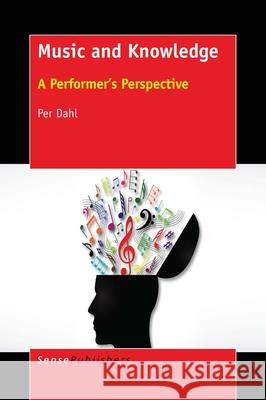Music and Knowledge » książka
Music and Knowledge
ISBN-13: 9789463008860 / Angielski / Twarda / 2017 / 172 str.
Music and Knowledge
ISBN-13: 9789463008860 / Angielski / Twarda / 2017 / 172 str.
(netto: 419,90 VAT: 5%)
Najniższa cena z 30 dni: 425,63
ok. 30 dni roboczych.
Darmowa dostawa!
This book illustrates the acquisition of knowledge in a musician's performative practice, and how this can contribute to the development of Artistic Research. Using a broad understanding of 'knowledge, ' the first part of the book presents aspects of the practitioner knowledge a musician develops through daily exercises and performances. Technical and practical skills, creativity and music reading are central topics. Part II describes four different methodologies of knowledge accumulation. First is the hypothetico-deductive method (music as object). Then the author asks, "Where is the musical work?" After an introduction to semiotics, the question that must follow is "Is music a language?" Following up methodologies focusing on intersubjective and contextual topics, the presentation of hermeneutics generates the question "What happens to the music when you are listening?" Being the most subjective, phenomenology is the last methodology to be presented. The question it poses is "Are analysis and interpretation two sides of the same coin?" Artistic research is a new perspective in knowledge acquisition, and the performing artist is the pivot point. The obvious insight positioning music beyond the score is elaborated into a critique of the representational theory as a relevant ontological discourse in music. As an alternative, the potential in embodied meaning theories is discussed through cognitive, linguistic and artistic approaches. Artistic expressions convey the subjective practitioner knowledge based on the difference between the objective sign and the intersubjective expression. This makes music as communication the ultimate topic. In conclusion, understanding the meaning construction and the conditions of artistic content are both of importance in artistic research.
This book illustrates the acquisition of knowledge in a musician’s performative practice, and how this can contribute to the development of Artistic Research. Using a broad understanding of ‘knowledge,’ the first part of the book presents aspects of the practitioner knowledge a musician develops through daily exercises and performances. Technical and practical skills, creativity and music reading are central topics.Part II describes four different methodologies of knowledge accumulation. First is the hypothetico-deductive method (music as object). Then the author asks, “Where is the musical work?” After an introduction to semiotics, the question that must follow is “Is music a language?” Following up methodologies focusing on intersubjective and contextual topics, the presentation of hermeneutics generates the question “What happens to the music when you are listening?” Being the most subjective, phenomenology is the last methodology to be presented. The question it poses is “Are analysis and interpretation two sides of the same coin?”Artistic research is a new perspective in knowledge acquisition, and the performing artist is the pivot point. The obvious insight positioning music beyond the score is elaborated into a critique of the representational theory as a relevant ontological discourse in music. As an alternative, the potential in embodied meaning theories is discussed through cognitive, linguistic and artistic approaches. Artistic expressions convey the subjective practitioner knowledge based on the difference between the objective sign and the intersubjective expression. This makes music as communication the ultimate topic. In conclusion, understanding the meaning construction and the conditions of artistic content are both of importance in artistic research.











